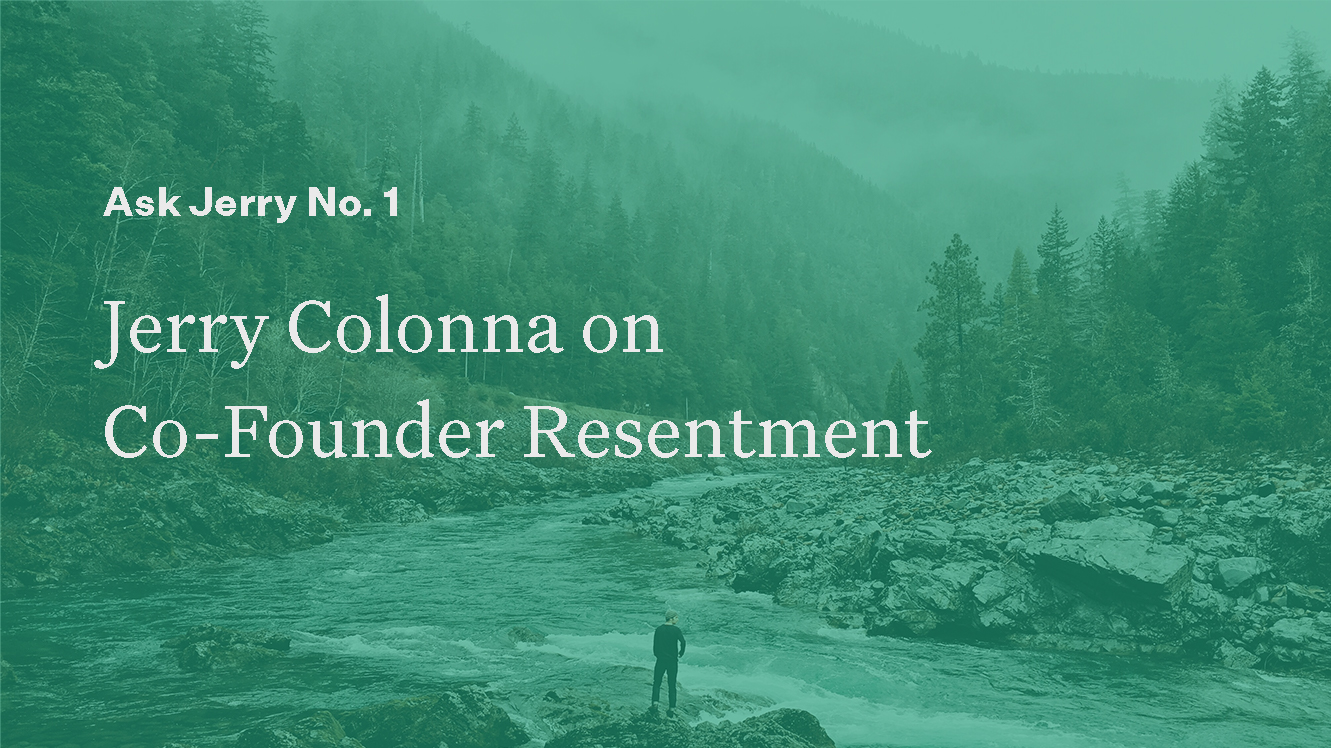
This post was written by Jerry Colonna and Andy Sparks.
Ask Jerry is a new limited series produced by Andy Sparks and the team at Everything, featuring Jerry Colonna, author of Reboot: Leadership and the Art of Growing Up, and CEO of executive coaching and leadership development firm Reboot.
Since founding Reboot in 2014, Jerry has developed a reputation for helping leaders grow through what he calls “radical self-inquiry,” and he is one of the most sought after coaches in the world of startups. In this series, we discuss questions about psychological habits, behavioral patterns, and the inner demons that can lead people to succeed—yet can be detrimental to their relationships and well-being. Submit your question here.
Andy Sparks: When Nathan Baschez pitched me on this column, I had to try and play it cool.
Nathan already knew I’d be leaving my role as CEO of Holloway, a digital publisher, to study co-founders’ different relationships—my hope being to help leaders deal better with each other, their companies, and society. Only days before speaking with Nathan, I’d enrolled at The Hudson Institute’s coach certification program on the recommendation from Reboot co-founder Khalid Halim.
Both Jerry and Khalid parlayed their experience building and investing in companies into establishing one of the world’s most famous coaching programs. Jerry’s ideas around radical self inquiry and bringing our whole selves to work have transformed leadership best practices, and are a constant through-line in the conversations I have with other founders.
I’d had the pleasure of crossing paths with Jerry in the summer of 2015 when Danielle and Kevin Morrill, my co-founders at Mattermark, went on a week-long co-founder “bootcamp,” joined by several other groups of co-founders for what was essentially couples (or thruples) therapy. I marveled at how Jerry and his team at Reboot—the coaching business he started in 2014—were able to get people to see how complicated our relationships are.
Listening to each group share truths and tears in our circle of couches in the mountains of Colorado, I developed a deep reverence for the struggles co-founders go through with each other when building companies. I can easily trace the roots of the new path I’m on to that one week with Jerry. Getting a chance to work with him felt like that Paolo Coehlo line from The Alchemist: “And, when you want something, all the universe conspires in helping you to achieve it.”
Lo these many years later, I sat down with Jerry again (virtually) to begin a series of conversations that we’ll split into questions and answers which we’ll publish here and in the Everything bundle.
In this inaugural edition, we chose a question from the community (send us yours here!) about resentment between co-founders, a familiar challenge to those who sign up to work together. Jerry shares his thoughts on what's at the root of resentment between co-founders and how to address it.
My co-founder is the CEO. I work just as hard as they do, but I have less equity. How do I manage my feelings of resentment?
Jerry Colonna: I recognize this feeling of resentment. And I want to start by saying I totally understand the feeling, and it's hard—it is really, really hard.
Implicit in this question is a premise: that there is a structural way to solve for resentment. In other words, it's implied that if I could wave a magic wand and give the founders the same amount of equity, then the resentment would go away.
But my experience is that this kind of structural fix doesn't actually solve the resentment.
If I want to understand the actual cause of resentment in a relationship like this, I generally ask, “When was the decision made about equity? What was that conversation like?”
Why? There are many reasons co-founders choose to split equity unequally, and learning about these reasons will, more often than not, reveal the power inequities in the relationship. These power inequities are the true source of resentment in co-founder relationships.
What are some examples of power inequities? Maybe you don’t have the same authority and agency to make the changes that you know need to be made, but your stupid co-founder doesn’t get it. Or maybe you feel resentful because you don’t get the same kind of visibility as your co-founder. Or maybe you don’t have clearly defined roles. There’s no delineation of responsibilities, and that delineation leads to dysfunction.
The decisions founders make in the early days of a company—how to split equity, who will be responsible and accountable for what, who will be the CEO—set the tone of the founders’ relationship. These conversations involve negotiating roles, responsibilities, and reward structures like equity, and so it follows that they’re going to be tricky to navigate.
Often co-founders fail to decide who will be CEO or what their responsibilities will be in a way that respects the impact these decisions have. They agree that the extrovert will be the CEO. Who died and made that rule? That’s never the right way to decide who should be the CEO.
Co-founder issues start when entrepreneurs fail to address these kinds of questions clearly and bravely at the beginning, and then they fester from there.
When co-founders avoid challenging conversations at the outset, they’re more likely to avoid facing uncomfortable realities further down the road. It’s these unspoken painful realities that become the cause of resentment.
So the first lesson is to have these kinds of conversations from the very beginning, if you can.
But what if that ship has sailed? What if you’re years into a working relationship with your co-founder?
If you want to get to the heart of your resentment, you need to get in the habit of having uncomfortable conversations with your co-founders, now.
Remember, you’re in this together. If something isn’t working for one of you, it’s time for you and your co-founder to sit down and talk about it. And while you’re at it, commit to a new habit of having challenging conversations over and over again.
I’ll leave you with this: The number one source of problems within organizations is co-founder conflict, and the number one source of co-founder conflict is the inability to communicate effectively like adults about issues of conflict.
Exercises on Co-Founder Conflict
If you’re struggling with issues related to co-founder conflict, ask yourself whether any of the following issues are worth having a conversation about with your co-founder:
- Do we have clear lines of delineation with regard to what we’re responsible for and what we can be held accountable for?
- Are there any issues in our relationship that we didn’t address at the very beginning that would be worth revisiting?
- Do we have an agreement to hold difficult conversations or do we routinely put them off?
Resources on Co-Founder Conflict
- Co-Founder Reboot: A free five-day self-guided course designed by Reboot. The Reboot team created this course to take you and your co-founder(s) through lessons and exercises designed to bring understanding, alignment, efficiency, and satisfaction to your relationship.
- Anyone interested in learning more about the subject of co-founder equity splits should read chapter six of Noam Wasserman’s The Founder’s Dilemmas. He uses ten years of research on startup founding teams to describe the structural differences between co-founder reward systems.
- The Real Reason Your Startup May Be Struggling: By Reboot coach Jeff Riddle, this is an actionable piece that shares a framework for how co-founders can create space in their relationship to support each other.
- Crucial Conversations, by Kerry Patterson, Joseph Grenny, Ron McMillan, and Al Switzler is another time-tested resource for navigating challenging conversations. It’s a must-read for any founder.
This conversation was originally recorded by Paul Smalera. Edits by Rachel Jepsen. Photo credit to Steve Carter.
The Only Subscription
You Need to
Stay at the
Edge of AI
The essential toolkit for those shaping the future
"This might be the best value you
can get from an AI subscription."
- Jay S.
Join 100,000+ leaders, builders, and innovators

Email address
Already have an account? Sign in
What is included in a subscription?
Daily insights from AI pioneers + early access to powerful AI tools








Comments
Don't have an account? Sign up!